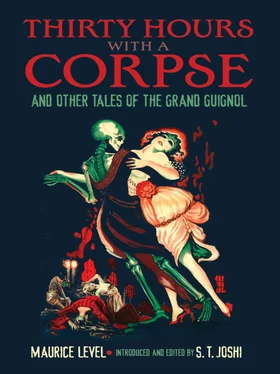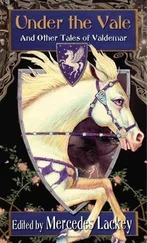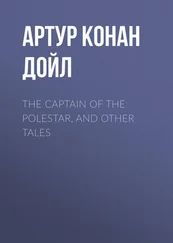“She began to stammer words that increased my fear. Hardly knowing what I was doing, I said:
“‘Sir, she is not completely under…’
“‘Because she chatters?… What does that matter so long as
she doesn’t move?…’
“At that moment her voice rose clearly, every word distinct:
“‘I’m not afraid… You are with me… You put me to sleep…’
“There was no knowing what she might say next, and terrified, I administered more chloroform… Four, five times, tilt on tilt, I poured it on the compress and held it to her face. Her voice, now uneven, came to me muffled by the handkerchief I held against her mouth.
“‘I am asleep… I can hear the bells… When I am well again we will go for walks together as we used to…’
“I lost my head. I thought that her husband, who was in the next room and probably near the door, would hear, that the others would understand. She, so proud, she whom no suspicion had ever touched, who till then had been above all suspicion, would be dishonored.
“To get her quite under, to try to keep her silent, I tilted the bottle, I tilted it again. The compress became heavy in my hand.
“‘We shall be together… at night,’ chanted the voice. ‘And you will take me in your arms again… you will…’
“I lost my reason. What would the next words be? I poured… I poured… I no longer knew what I was doing.
“Then came the moment when I found that the bottle was empty. I realized that I had given too much. Terrified, I flung the compress away; with a hasty finger I lifted one of her eyelids and saw that the pupil of the eye was fixed, dilated so that there was nothing left of the iris but a transparent ring. I wanted to shout: ‘Stop!…’
“The word was strangled by the contraction in my throat.
“At the same moment I heard the voice of my chief, short and anxious:
“‘What’s this… What… the blood-pressure is low.’
“With a violent movement he pushed me away:
“‘But she’s not breathing… Some oxygen… some ether… quick…’
“Alas! Too late.
“Her poor head rolled lifeless; her blue eye, the eyelid still up, was glazed and looked at me with an empty stare…
“We tried everything, but nothing was any good. Syncope, the horrible white syncope, as we call it, had taken her from me.”
For a few moments he sat lost in thought, then went on:
“I know perfectly well that such accidents happen frequently; that no one is safe from the treachery of chloroform. But I also know that if I had not loved her and had done my work with cold indifference; if I had not been overwhelmed by the double anguish of holding her life in my hands and hearing her unconsciously betraying the secret that would ruin her, I should not have to reproach myself with causing her death…”
He was silent. A wave of sadness passed through the room as if it had been carried in on the chilly autumn wind that blew against the damp window.
Madame Chaligny, her head on the back of her armchair, sat gazing into space like a person lost in a dream.
The party broke up early that night.
WORN OUT with fatigue, half dead with hunger, Ferrou got to the gates of Paris as night was falling. For eight days he had dragged himself from village to village, getting strength from the desire to see once again, now that he was out of prison, the great city with its broad streets and the narrow roads which night suddenly peoples with moving and silent forms. For five years he had thought of nothing but his return, storing up hate and a desire for murder strong enough to make his first action the purchase of a knife he had sharpened in the dark on the stone edge of a well. As he walked along, his fingers were constantly on the handle.
Lights were appearing in the windows of some houses that stood in their own gardens. One of these remained dark, and but for the smoke that rose from a chimney, it might have been empty. The rare passers-by hurried along; here and there in the distance streetlamps flickered. It was quite dark now, a cold, dreary winter’s night. Ferrou stood still: push on to Paris? He had not the strength; sleep where he was, in the cutting wind, with no covering but his rags? Impossible. He had left behind him the country stables where the straw makes a warm bed for vagabonds; there were no more village inns… and even if there were?… he had not a halfpenny in his pocket. For a second time the little house without lights attracted his attention. He was alone, he was cold, he was hungry, this shelter was as good as any other… He walked through the garden, listened, drew back a window shutter and found that the window was unfastened. He opened it, and at a bound was in the house. The window shut, he felt about in the dark, touching a bed, a small table; the drapery of a hanging wardrobe gave way to his hand; he raised it, felt the clothes beneath it, let it fall again. Then he found a door, opened it, and a savory smell of cooking tempted his nostrils.
“No good,” he thought, “there’s someone in the house. I must clear out…”
He turned to go, then stopped. Go where? To die of hunger on the road? If anyone came in, he could hide. Then, his thoughts running off into another channel, he said to himself:
“You are cold, and it is warm here; you are hungry, and hot food will soon be ready; you have no money, and there is sure to be a full stocking hidden somewhere. You will probably have time to do all you want before anyone disturbs you, and if you are disturbed…”
He opened his knife, tried the point on the palm of his hand, the edge on his nail, and murmuring: “The first who tries to stop me!…” went into the kitchen, lifted the lid of the pan, pricked the meat, and sneered:
“Not cooked enough; I will come back…”
But as he turned away there was a sound of steps outside. He heard the latch of the garden-gate lifted, the crunching of the gravel, and quickly, just as a key turned in the door, he slipped into the other room, raised the wardrobe-hanging and crouched down among the clothes. Not too soon: a man was coming into the house. This man lit a lamp, threw his coat over a chair, and began to pace the room. From his hiding place Ferrou saw him coming and going. He was a big man with large hands and square shoulders; his heavy, measured steps gave an impression of strength.
“The devil!” thought Ferrou. “It’s not when the stomach has been empty for a week that a man is in a state to attack a lump like that!”
The man sat down and, his head resting on his hands, seemed to be thinking deeply. The bell sounded; he rose, saying:
“Is it you, Marie?”
“Yes. I went to bring the boy home from school. He hadn’t taken his raincoat, and it’s snowing.”
The man took the child on his knee, stroking his hair. From the kitchen the woman said:
“I didn’t hurry. You are earlier than usual; it’s only half-past six. You didn’t find your friends at the café?”
“Yes. But we had special work this afternoon, and tonight I must go out.”
“Well, everything’s ready. We can begin at once.”
“Go on without me; I’m not hungry. I will lie down on my bed; you must wake me at eleven o’clock.”
“All right. Come, little one, supper’s ready. Let your father rest, he is tired.”
The child went out of the room, and the man stretched himself on the bed.
“It is half-past six,” thought Ferrou, “and he doesn’t clear out till eleven. Five hours of this!”
Through the half-open door came the clatter of plates and the sound of the two voices. Now and again Ferrou was tempted to leave his hiding-place, to spring on the sleeping man, to stab him; then, imagining the unequal struggle, the noise, the too long and dangerous massacre of three beings, the woman and child clinging to his arm like cats, paralyzing his movements, he decided to wait. Once the man was gone, it would be easy to settle the woman and child. He had abandoned all idea of a quiet robbery. His stomach was too empty and his heart too full of hate to be satisfied with so little. His weakness made him ferocious; he had a knife, and it was there to be used.
Читать дальше












